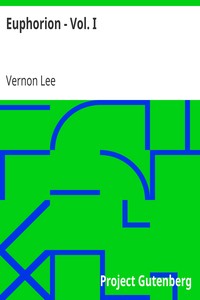Euphorion - Vol. I by Vernon Lee
"Euphorion: Being Studies of the Antique and the Mediæval in the Renaissance" by Vernon Lee is a scholarly work written in the late 19th century. The book explores the complex interplay between the Medieval and Classical influences during the Renaissance, using the allegory of Faustus and Helena to symbolize the cultural lineage of that era. Through this lens, Lee aims to delve into the evolving nature of cultural knowledge and moral understanding,
particularly in the context of Renaissance Italy. The opening of the book sets the stage for a profound examination of the Renaissance as a pivotal moment in the history of human thought and artistic expression. Lee introduces the characters of Faustus, representing the Middle Ages, and Helena, embodying Antiquity, discussing their symbolic child, Euphorion, which he identifies as the Renaissance itself. This section contemplates the contradictions inherent in the Renaissance—its remarkable advancements juxtaposed against moral degradation—framing this cultural period as a phase of both enlightenment and chaos. The analytical tone invites readers to consider not only the historical context of the Renaissance but also its lasting implications on modern civilization. (This is an automatically generated summary.)
Read or download for free
| How to read | Url | Size | |||
|---|---|---|---|---|---|
| Read now! | https://www.gutenberg.org/ebooks/31303.html.images | 326 kB | |||
| EPUB3 (E-readers incl. Send-to-Kindle) | https://www.gutenberg.org/ebooks/31303.epub3.images | 187 kB | |||
| EPUB (older E-readers) | https://www.gutenberg.org/ebooks/31303.epub.images | 190 kB | |||
| Kindle | https://www.gutenberg.org/ebooks/31303.kf8.images | 340 kB | |||
| older Kindles | https://www.gutenberg.org/ebooks/31303.kindle.images | 324 kB | |||
| Plain Text UTF-8 | https://www.gutenberg.org/ebooks/31303.txt.utf-8 | 314 kB | |||
| Download HTML (zip) | https://www.gutenberg.org/cache/epub/31303/pg31303-h.zip | 183 kB | |||
| There may be more files related to this item. | |||||
Similar Books
About this eBook
| Author | Lee, Vernon, 1856-1935 |
|---|---|
| Title |
Euphorion - Vol. I Being Studies of the Antique and the Mediaeval in the Renaissance |
| Contents | Introduction -- The sacrifice -- The Italy of the Elizabethan dramatists -- The out-door poetry -- Symmetria prisca. |
| Credits | Produced by Marc D'Hooghe |
| Reading Level | Reading ease score: 33.1 (College-level). Difficult to read. |
| Language | English |
| LoC Class | CB: History: History of civilization |
| LoC Class | PN: Language and Literatures: Literature: General, Criticism, Collections |
| Subject | Civilization, Medieval |
| Subject | Renaissance -- Italy |
| Subject | Love |
| Subject | English drama -- Early modern and Elizabethan, 1500-1600 -- History and criticism |
| Subject | Boiardo, Matteo Maria, 1440 or 1441-1494 |
| Subject | Epic poetry, Italian -- History and criticism |
| Category | Text |
| EBook-No. | 31303 |
| Release Date | Feb 17, 2010 |
| Copyright Status | Public domain in the USA. |
| Downloads | 264 downloads in the last 30 days. |
| Project Gutenberg eBooks are always free! | |

